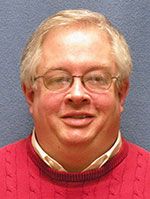Faith and Family / Sean Gallagher
Don’t play the blame game during Lent
 I’ve found over my years as a father that there’s an advantage for each of my boys as they grow up with four brothers: There’s always someone else to push the blame onto when they’ve done something wrong.
I’ve found over my years as a father that there’s an advantage for each of my boys as they grow up with four brothers: There’s always someone else to push the blame onto when they’ve done something wrong.
Playing the blame game, though, is not exclusive to young boys. We adults can do it with the best of them. Politicians seem to be particularly proficient at it.
It’s actually a deeply ingrained part of our broken human condition that resulted from the original sin of Adam and Eve.
The account in Genesis of their fall will be proclaimed in the first reading this weekend on the First Sunday of Lent. The reading ends, though, before God confronts Adam and Eve about their choice to eat from the fruit of the tree of the knowledge of good and evil.
The exchange between God and our first parents demonstrates our tendency to blame others for our own sins.
When God asks Adam and Eve about their sin, they try to shift the blame. Eve (who spoke second) simply blames the devil, saying “The snake tricked me, so I ate it” (Gen 3:13).
Adam, though, really takes the cake. Not only does he try to blame Eve, he even suggests that God was at fault since he put her there with him: “The woman whom you put here with me—she gave me fruit from the tree, so I ate it” (Gen 3:12).
In response, our heavenly Father simply lays out to Adam and Eve the hard consequences of their sin. But, while speaking to the serpent, he also offers them the promise of victory over sin and the devil: “I will put enmity between you and the woman, and between your offspring and hers; they will strike at your head, while you strike at their heel” (Gen 3:15).
The last words that God speaks to Adam and Eve should still be ringing in our ears, for they were spoken on Ash Wednesday: “You are dust, and to dust you shall return” (Gen 3:19).
It is fitting, then, that the account of the fall of Adam and Eve is proclaimed at the start of Lent.
This is a season of preparation for us to celebrate the paschal mystery—Christ’s passion, death and resurrection. God drew us into his Son’s dying and rising at our baptism, and he gives us the grace to live it out in many small and sometimes large ways in our daily lives.
While this necessarily involves us in suffering, it gives great meaning to our pain and leads us ultimately to the infinite joy of Christ’s victory over death.
But we avoid entering into the paschal mystery when we fail to acknowledge our sins, when we act as if we’re innocent while passing the blame onto others.
Maybe when we play the blame game, we’re afraid that we won’t be forgiven, that God will only be angry with us if we confess our sins. That fear must be rooted deep in our hearts if all of the testimony of God’s love and mercy seen throughout the Bible and in the lives of the saints don’t convince us to trust him and his offer of redemption.
As a father, I’ve learned that a little contrition goes a long way. Reconciliation happens so easily when my sons show just a little bit that they’ve done wrong and are sorry.
Let’s avoid the blame game during Lent, acknowledge our sins and be open to God’s loving mercy that’s especially available to us in the sacrament of penance. †
 I’ve found over my years as a father that there’s an advantage for each of my boys as they grow up with four brothers: There’s always someone else to push the blame onto when they’ve done something wrong.
I’ve found over my years as a father that there’s an advantage for each of my boys as they grow up with four brothers: There’s always someone else to push the blame onto when they’ve done something wrong.